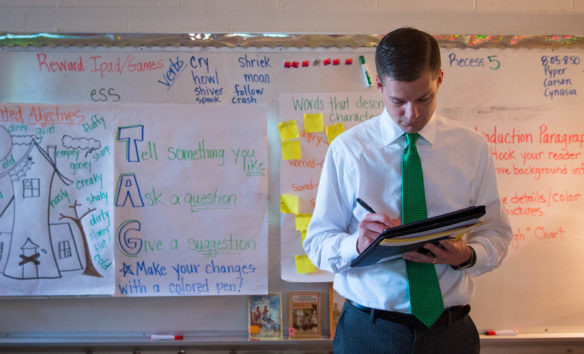Before reading this entry, be sure to check out Part One for additional reminders when planning professional learning, as well as Creating a Predictable Structure for Professional Learning.

Michelle Morris Jones
In addition to establishing clear standards for both agendas and routines—it is important to create an environment throughout all professional learning that encourages deep thinking, rigor and collegiality. Below are additional reminders for your professional learning planning process.
Create Affirming and Probing Questions
Affirming and probing questions promote efficacy and allow learners to personalize their learning and experiences. Participants are able to tap into positive prior experiences when creating new knowledge or trying new instructional practices.
By basing learning on questions, we can also create an inquiry stance and energy source that propels learners to go into greater depth.
- What is at the heart of your professional learning plan?
- What is the big, beautiful question that creates energy and excitement?
- What can be explored in depth? How can you inspire an inquiry stance?
Some additional resources for asking questions include the School Reform Initiative’s “Pocket Guide to Probing Questions” (PDF) and Warren Berger’s A More Beautiful Question.
Create Opportunities for Rigor
As instructional leaders we want adult learning to be engaging and intellectually rigorous. Consider setting a tone for learning focused dialogue which leads to collegial commitment and collective implementation of shared goals, take time to engage in professional reading, use protocols to elevate discourse and reflection, and allow for implementation and approximation between sessions.
- How might your colleagues’ intellect be engaged?
- How will participation be fostered? Who’s doing the reading, writing, talking, and problem solving?
- What are the expectations for approximation and application? How will student and teacher work be utilized to elevate the learning?
- Are there opportunities to integrate digital communities to support implementation and reflection?
Create Community that Supports Collegiality
As facilitators of adult learning we must be mindful of community. We know that relationships and trust are critical components of high functioning learning communities. Take time to promote bonding and a sense of community.
Manage the energy of the group to ensure that the work outlined is accomplished by establishing public agreements. Communicate with group members to gather feedback, respond to questions, and provide support.
- How might the energy of the group be managed to ensure productivity?
- How might there be a mix of serious and light experiences or activities?
- What is the role of discourse and interaction to build understanding and relationships?
Facilitating learning for adults is fun, creative, and rewarding. With these reminders, I hope you are able to enjoy your work with colleagues, teams, and groups!

